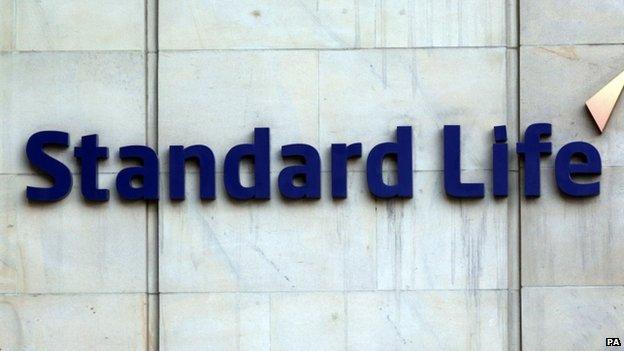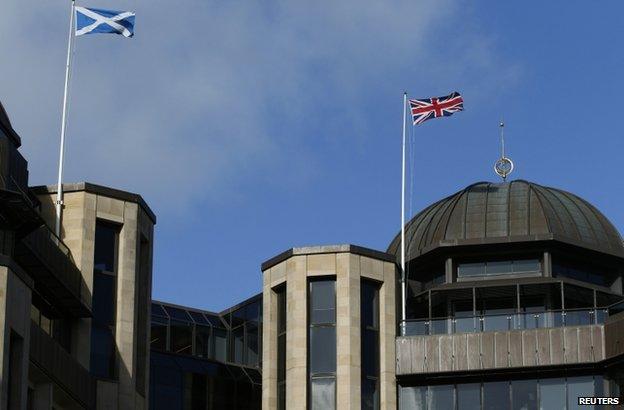Scottish independence: Standard strife at Holyrood
- Published
A peculiarly acute dilemma confronts Alex Salmond and the Scottish government with regard to the comments from Standard Life.
Mr Salmond tells MSPs and others that he has answers ready to the concerns raised by the Edinburgh finance company relating to the possible consequences of independence.
Those answers, derived largely from his government's fiscal commission, deal with issues such as currency and regulation, cited by Standard Life among their concerns.
On currency, a sterling zone. On regulation, a shared arrangement with the Bank of England.
Snag is that implementing those answers requires agreement from elsewhere, requires another party to consent.
Continuing doubt
And that other party just happens to be the United Kingdom government (and its agencies.) The same UK government which is fighting hard to forestall independence.
To reassure Standard Life, Mr Salmond needs to produce an agreement with London on, for example, the currency.

Standard Life said it was looking for assurances on a number of issues
He needs London to say yes, now, in advance of the referendum. In order to foster continuing doubt, it is in London's interests to say no, at least up to the date of the referendum.
This conundrum confronts Mr Salmond - as the meanderings on this site have noted ad nauseam - because his plan for independence involves a very large degree of interdependence.
In order to assure the people of Scotland that independence is part of a continuum from devolution, he includes elements like the monarchy, the pound, membership of the EU and NATO.
In the context of broader Scottish opinion, this is perfectly understandable.
But aspects of those very elements require external consent.
Seeking clarity
And the UK government is, for its own interests as stated earlier, denying that consent in the areas over which it has control and striving to ensure that consent is minimal elsewhere, to the extent that it is able to influence such matters.
To be clear, Standard Life is not saying that it will quit Scotland solely on the basis of independence.
Rather, the company says it wants concomitant assurances on five issues: the currency; ratification of EU membership within the target date of March 2016; the monetary system; financial regulation and consumer protection; individual taxation, especially around savings and pensions.

Standard Life is regarded as an important Scottish company
The company says it will continue to seek "clarity on these matters". It adds however that "uncertainty is likely to remain".
I suspect their analysis may be accurate in that regard. The issue of EU membership has generated competing claims without, to date, precise resolution.
Given that it is in the interests of the UK government to promote uncertainty and doubt, in order to deflect the people of Scotland from independence, it seems unlikely that UK Ministers will move to remove those anxieties any time soon.
At Holyrood, nationalists talk of how Standard Life has "form" on the issue of the constitution.
Devolution comments
They recall the company's stated opposition to the proposal for devolution in 1979. They recall the letter from the company sent to staff in 1992 warning of uncertainty associated with any constitutional change.
By 1997, Standard Life and other Scottish companies were largely silent on the question of devolution.
By then, they were facing a done deal - the virtual certainty of a Yes vote.
Plus they were dealing with a newly elected UK government with a huge majority and a disinclination to take lectures from business, as expressed extremely bluntly by John Prescott.
None of which alters the conundrum expressed at the outset - except inasmuch as canvassers on the doorsteps may be able to attempt to discount the new comments on the basis of historic memories.